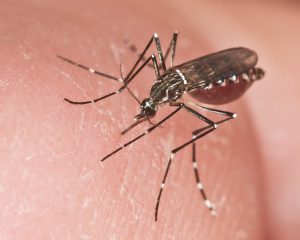
After a hurricane, flooding and scattered debris that hold water are breeding grounds for mosquitoes.
“An increase in mosquito numbers can most likely be expected in the weeks following a hurricane,” said Eva Buckner, an assistant professor and medical entomologist at the University of Florida’s Institute of Food and Agricultural Sciences (UF/IFAS).
Buckner, an Extension specialist at UF/IFAS Florida Medical Entomology Laboratory in Vero Beach, remains in close contact with Florida’s more than 65 mosquito control districts providing training, solutions and information on topics including mosquito identification, mosquito-borne diseases, integrated mosquito management and more.
Buckner offers the following facts and tips to keep consumers from getting bitten, eliminate those breeding grounds during hurricane recovery and dispel myths about mosquito-borne diseases.
Q: Can hurricanes promote mosquito breeding.?
A: The flooding from hurricanes can cause mosquito eggs laid in the soil by floodwater mosquitoes during previous floods to hatch. This can result in very large populations of floodwater mosquitoes. Most of these mosquitoes are considered nuisance mosquitoes because they can be annoying biters that do not transmit any viruses to humans. Additionally, if floodwaters do not recede, standing water mosquitoes may start laying eggs on the standing water.
Q: Do these mosquitos carry illnesses like Zika and West Nile Virus?
A: In general floodwater mosquitoes are just considered nuisance mosquitoes, except for Aedes aegypti, the yellow fever mosquito. This species can transmit chikungunya, Zika and dengue virus.
In Florida, this species can be found in some suburban and urban areas in the state. In areas with Aedes aegypti, increased rainfall may result in increased hatching of Aedes aegypti eggs from water-holding containers.
We’ve had no travel-related cases of chikungunya or Zika this year, so no transmission of these viruses is expected in Florida post-Ian. However, the risk of getting infected with dengue virus from Aedes aegypti may be slightly increased.
Also, some species of standing water mosquitoes can transmit West Nile virus, so steps should be taken to protect from mosquito bites.
Q: What steps can residents take to protect themselves from mosquito bites?
A: Most important tip to remember is to wear long-sleeved shirts and long pants. Use Environmental Protection Agency (EPA)-registered insect repellents with one of the following active ingredients: DEET, picaridin, IR3535, oil of lemon eucalyptus, para-menthane-diol or 2-undecanone.
Q: What steps can consumers take to control mosquitoes inside and outside of their property?
A: Draining water is recommended for reducing mosquito habitats in water-holding containers that individual homeowners have control over, such as pet dishes, vases, birdbaths, buckets, toys, flowerpot saucers and cans. You can help reduce your risk of diseases just by dumping containers. To kill immature mosquitoes in pools at homes without electricity to run pumps, use mosquito bits or dunks. These microbial insecticides can be purchased at hardware or box stores. For vast water sources, it is best to leave the source reduction and treatment to the mosquito control agencies. Contact your local mosquito control program to ask for treatment request.
Para acceder a esta comunicación en español, por favor utilice este enlace.
###
By Lourdes Mederos, rodriguezl@ufl.edu
ABOUT UF/IFAS
The mission of the University of Florida Institute of Food and Agricultural Sciences (UF/IFAS) is to develop knowledge relevant to agricultural, human and natural resources and to make that knowledge available to sustain and enhance the quality of human life. With more than a dozen research facilities, 67 county Extension offices, and award-winning students and faculty in the UF College of Agricultural and Life Sciences, UF/IFAS brings science-based solutions to the state’s agricultural and natural resources industries, and all Florida residents.
 1
1
